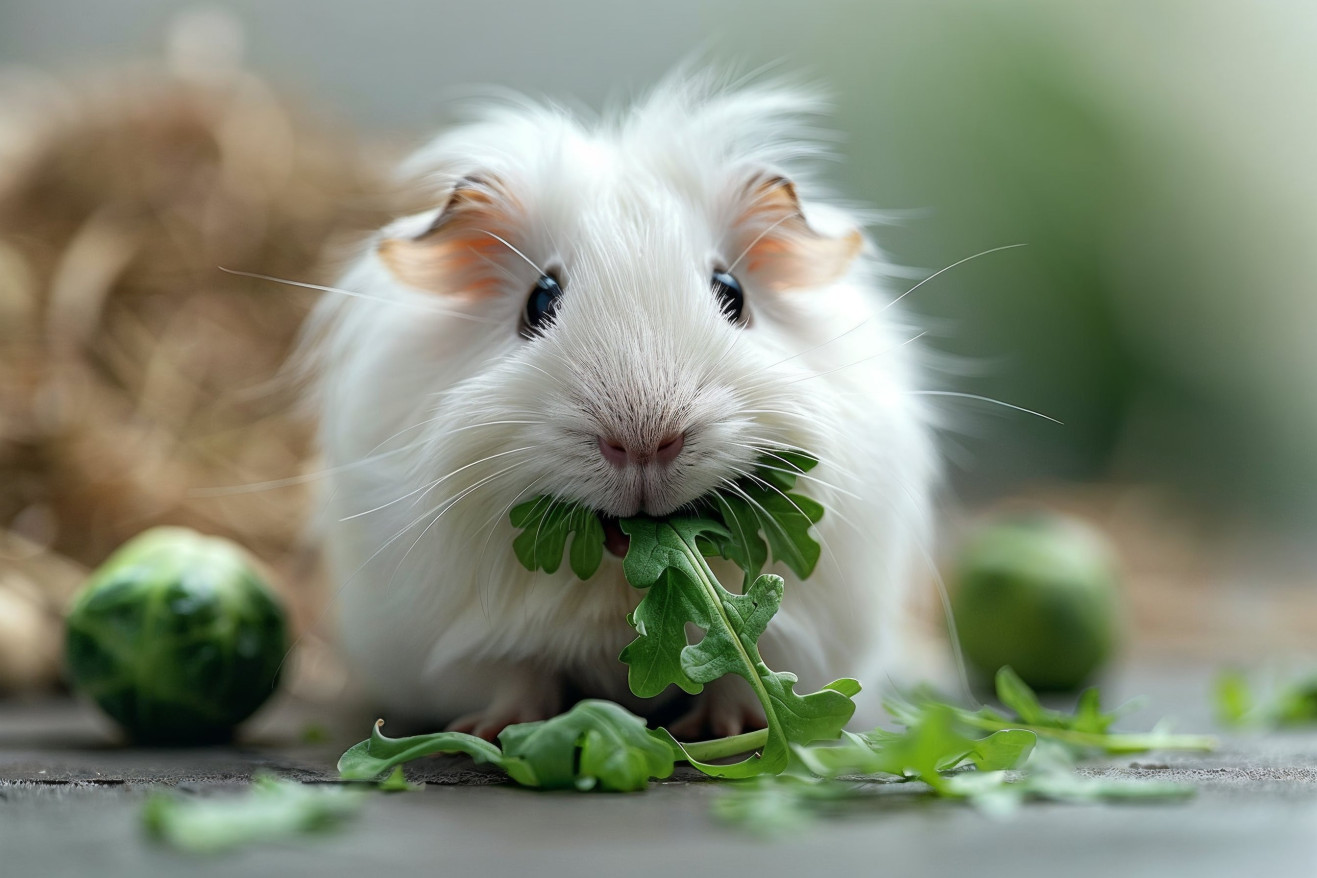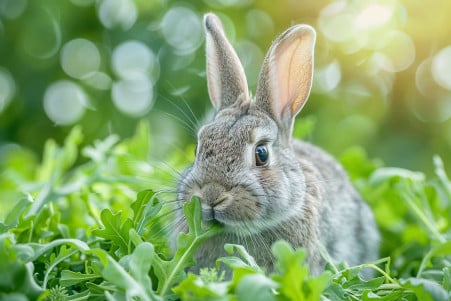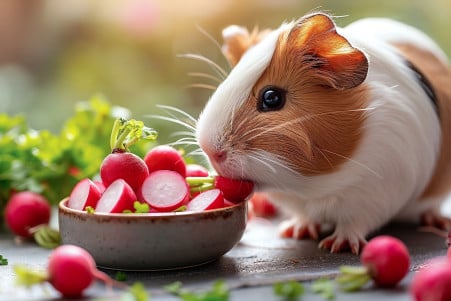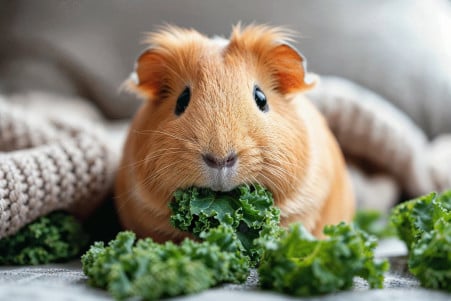Can Guinea Pigs Eat Arugula? Benefits and Risks
13 April 2024 • Updated 13 April 2024

Guinea pigs can have arugula in small amounts as an occasional leafy green, but it's important to know the potential risks and benefits of adding it to their diet. Arugula, which is also called rocket, is generally safe for guinea pigs and provides vitamin C, vitamin K, and antioxidants. However, it's high in calcium, so it should be used as a supplement to the guinea pig's main diet of pellets, timothy hay, and vitamin C-rich vegetables like bell peppers, rather than a replacement.
To help pet parents better understand how to safely add arugula to their guinea pigs' diets, we'll cover the recommendations of exotic animal vets and guinea pig rescues. This research is based on nutritional information, case reports, and anecdotal evidence to provide an overview of the best serving sizes, how often to feed it, and any potential negative effects to be aware of when feeding guinea pigs this spicy green.
Can guinea pigs eat arugula?
Nutritional Value of Arugula for Guinea Pigs
Arugula is a nutrient-rich leafy green that can offer important vitamins and minerals to help supplement a guinea pig's diet. It's especially high in vitamin C, which is important for guinea pigs because they can't make it themselves. Arugula is also packed with other important nutrients like vitamin K, folate, and antioxidants that can help promote good health.
That said, arugula is high in calcium, so it should be fed in moderation to prevent potential health problems like bladder stones. As noted by Guinea Piggles, guinea pigs need a diet that's well-balanced and that includes the right amount of calcium. While arugula can be a good source of certain nutrients, it should be fed with other calcium-appropriate veggies like bell peppers and romaine lettuce to ensure guinea pigs get the right nutrients.
By learning about arugula's nutritional content and potential downsides, pet parents can make sure they're feeding it to their guinea pigs in a way that's safe and healthy. It's important to feed arugula in moderation and make sure it's a part of a well-rounded diet that includes other important nutrients.
How to Feed Arugula to Your Guinea Pig
The RSPCA suggests that guinea pigs should be fed a portion of fresh, washed leafy green or weed vegetables every day, such as kale or broccoli, which are both high in Vitamin C. Because of this, when you add arugula to your guinea pig's diet, it's important to do so slowly to prevent any tummy troubles.
Per Pet Keen, you should start by feeding your guinea pig 2-3 leaves of fresh, washed arugula and see how they react. If they seem to tolerate it well, you can slowly increase the portion size to a maximum of 1 cup per day. That said, you should only feed your guinea pig arugula 1-2 times per week since, according to Guinea Pig 101, it has a higher calcium content that can cause bladder stones if it's overconsumed.
It's important to make sure your guinea pig gets a well-rounded diet with lots of fiber, vitamins, and minerals. In addition to arugula, make sure to feed your guinea pig other leafy greens and vegetables to ensure they get all the nutrients they need.
What Other Leafy Greens and Vegetables Can Guinea Pigs Eat?
While arugula can be a good option for guinea pigs in moderation, it's important to remember that guinea pigs need a variety of leafy greens and vegetables in their diet. The RSPCA lists other good choices as including kale, romaine lettuce, parsley, and bell peppers. The PDSA also says that leafy greens should be the main part of a guinea pig's daily vegetable intake, as they are packed with fiber and important vitamins.
In addition, smaller amounts of root vegetables like carrots and squash can be fed to guinea pigs, as GuineaDad explains they are a good source of vitamin A, B6, and C. However, it's best to steer clear of high-oxalate greens like spinach and dandelion greens, which can lead to the formation of bladder stones according to the RSPCA.
With a well-rounded diet that includes nutrient-rich leafy greens and vegetables, guinea pig parents can make sure their pets get all the essential vitamins, minerals, and fiber they need to stay healthy.
Feeding Rules and Recommendations
According to Guinea Pigs Australia, guinea pigs should have unlimited access to high-quality grass, timothy, or oat hay as the main component of their diet. Fresh vegetables should be given every day, with a serving size of 1 cup per guinea pig, according to GuineaDad.
It's important to make sure that new foods are introduced slowly and that guinea pigs are watched for any signs of a bad reaction, according to GuineaDad. All fruits and vegetables should be washed before being given to guinea pigs to remove pesticides and other chemicals. Cooked, canned, or processed vegetables should be avoided as they can cause digestive problems in guinea pigs.
These detailed feeding rules and recommendations help ensure that guinea pig owners are able to provide their pets with a healthy, well-rounded diet that supports their health and wellness.
Conclusion: A Balanced Diet for Healthy Guinea Pigs
Arugula can be a nutritious addition to a guinea pig's diet when fed in moderation. According to Guinea Piggles, arugula, also known as rocket, is safe for guinea pigs to eat a few times a week when mixed with other greens and salad leaves.
Arugula is an excellent source of vitamins and minerals, including vitamin C, vitamin K, and antioxidants. However, it is also relatively high in calcium, which can contribute to the formation of bladder stones if overfed.
To safely incorporate arugula into a guinea pig's diet, it should be introduced gradually and offered in moderation, no more than 1-2 times per week. Portion sizes should start small, around 2-3 leaves, and be slowly increased over time up to a maximum of 1 cup per day.
Arugula should always be fed alongside a varied diet of other leafy greens, vegetables, hay, and guinea pig pellets to ensure a balanced intake of nutrients. According to the Humane Society, leafy greens like romaine lettuce, kale, and parsley should make up the bulk of a guinea pig's daily produce intake.
By following these guidelines and best practices, guinea pig owners can safely incorporate arugula as an occasional treat while maintaining a healthy, well-rounded diet for their pets.


